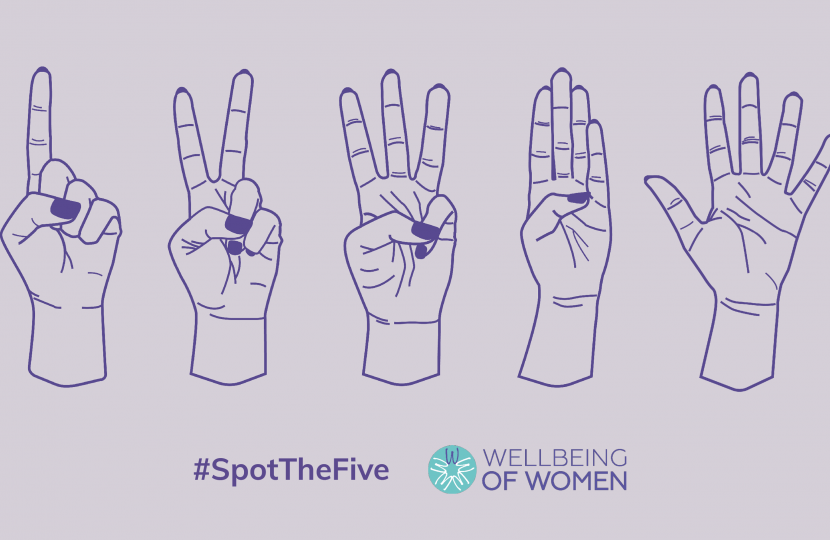
Throughout September, I have been championing on social media various initiatives in support of Gynaecological Cancer Awareness Month, as I know this issue is of such importance to so many women – and their families – across Carshalton and Wallington.
As the month draws to a close, I wanted to highlight some of the support that is available for women who may have concerns about a gynaecological cancer, and to encourage anyone who is worried to speak to their GP as soon as possible.
According to the women’s health research charity Wellbeing of Women, 21,000 women are diagnosed with a gynaecological cancer every year in the UK. That’s more than 400 women – our friends, sisters, mothers and daughters – every week.
There are five gynaecological cancers: cervical cancer, vulval cancer, vaginal cancer, womb cancer and ovarian cancer. Each has its own symptoms, frequency among women and characteristics. In the UK, each year there are:
- Womb cancer: 9,300 women diagnosed
- Ovarian cancer: 7,300 women diagnosed
- Cervical cancer: 3,200 women diagnosed
- Vulval cancer: 1,300 women diagnosed
- Vaginal cancer: 250 women diagnosed

Womb cancer is the fourth most common cancer in women in the UK and the most common of the five gynaecological cancers. Unfortunately, at the moment there is no screening test that is accurate and reliable enough to detect womb cancer in the general population. There is also no simple and reliable way to test for vaginal and vulval cancers in women who do not have any signs or symptoms.
However, at the moment, ovarian cancer causes more deaths each year than the other four gynaecological cancers combined. Unlike cervical cancer, there is currently no screening programme for ovarian cancer, although I am glad to hear that the Government has announced that a population screening programme is going to be reconsidered by the National Screening Committee, and I am supporting this on behalf of constituents who are affected.
It is so important for any women who have concerns about their gynaecological health – whether you have symptoms or not – to seek medical advice from your GP, and to be aware not only of the key signs and symptoms of each of the five gynaecological cancers but also to understand your risk factors.
There are many fantastic organisations out there doing important work in this area and, in addition to Wellbeing of Women that I’ve linked to above, I’d like to highlight resources, support, and information from:
- The Eve Appeal - the leading UK national charity funding research and raising awareness into the five gynaecological cancers – womb, ovarian, cervical, vulval and vaginal: https://eveappeal.org.uk
- Target Ovarian Cancer - the UK's leading ovarian cancer charity: https://targetovariancancer.org.uk
- Ovarian Cancer Action – the UK’s largest funder of scientific research into ovarian cancer, and awareness campaigner: https://ovarian.org.uk
- Jo’s Cervical Cancer Trust – the UK’s leading cervical cancer charity: https://www.jostrust.org.uk
You can also find support and further information via:
- Cancer Research UK: https://www.cancerresearchuk.org/about-cancer/womens-cancer
- Macmillan Cancer Support: https://www.macmillan.org.uk
- The Lady Garden Foundation: https://www.ladygardenfoundation.com
- Gynae Health Advice: https://www.facebook.com/GynaeHealthUK
- Action on Womb Cancer: https://www.facebook.com/ActiononWombCancer
Finally, one of my constituents, Dafina Malovska, has been tirelessly campaigning in support of yearly women’s health check-ups from adolescence in the UK, and her petition has gained more than 32k signatures so far. I understand that the issue is supported by the London PMS & Menopause Clinic, and that seeing a gynaecologist regularly – before symptoms develop – can ensure women keep optimally healthy – and vitally, any problems can be diagnosed and treated swiftly. This would lead to better outcomes for women, and better survival rates from female cancers. As a member of the Petitions Committee in Parliament which considers granting parliamentary time to matters raised in petitions, I have a policy of not signing petitions myself, however I would very much encourage residents of Carshalton and Wallington to sign Dafina’s petition and pledge their support for improving women’s health across the UK. (Should this petition come before the Committee, given my own support, I would rightly and properly recuse myself from its consideration.) You can view, and sign, her petition here: http://chng.it/GVtLGdfSbr
As ever, if I can be of support to any of my constituents on this or any other issue, please do let me know.
* Image of five types of gynae cancers courtesy of The Eve Appeal. Image of #SpotTheFive courtesy of Wellbeing of Women.

